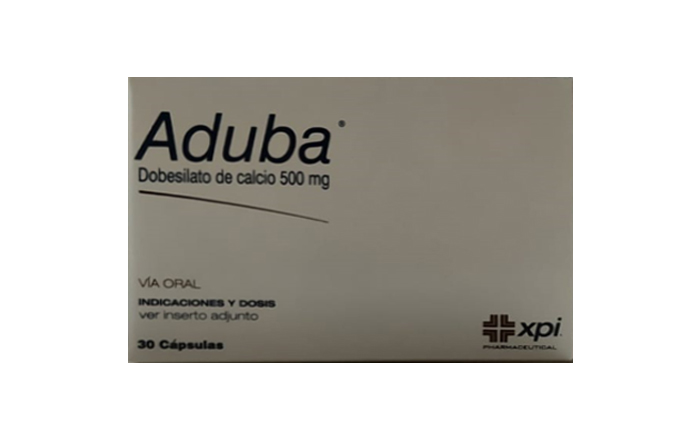[vc_row inner_container=»true» bg_color=»#ffffff» style=»margin-bottom:0px; padding-bottom:0px;»][vc_column alignment=»left» width=»1/2″]
Aduba
[/vc_column][vc_column width=»1/2″] [/vc_column][/vc_row][vc_row inner_container=»true» bg_color=»#ffffff» style=»margin-top:0px; margin-bottom:0px;»][vc_column width=»1/1″]
[/vc_column][/vc_row][vc_row inner_container=»true» bg_color=»#ffffff» style=»margin-top:0px; margin-bottom:0px;»][vc_column width=»1/1″]Pharmacological properties
Aduba contains Calcium Dobesilate, a phlebotropic with regulatory and protective action on capillary functions. Calcium dobesilate acts at the level of the capillary walls, regulating impaired physiological functions such as: increased permeability and decreased resistance. Action on the capillary wall: – Inhibits the vasoactive substances responsible for contraction or shortening of endothelial cells: bradykinin, histamine and serotonin, thus restoring the normal permeability of the capillary and reducing the extravasation of blood and fluids, therefore reducing the edema. – Inhibits enzymes that degrade mucopolysaccharides, components of the basement membrane, normalizing capillary resistance. – Increases collagen reinforcements which increases capillary resistance. Calcium dobesilate has an antioxidant effect due to its ability to inhibit the information of oxygen free radicals that damage the endothelium and to eliminate them. Action on blood: – Decreases the viscosity of plasma and blood, improving blood flow and tissue irrigation by different mechanisms at the level of platelets, plasma, erythrocytes and blood flow. – Inhibits platelet aggregation by increasing the production of nitric oxide, an important regulator of vascular tone; therefore it has antithrombotic properties. – Decreases the release of platelet proaggregating substances such as: thromboxane A2, PAF, Beta-TG, which reduces the risk of thrombosis and vascular occlusion. – Decreases the levels of fibrinogen and globulin that are contributors to diabetic retinopathy. – Decreases red cell aggregation and, thus, blood viscosity. – Increases the flexibility of red blood cells, improving capillary circulation, altered in cases of chronic venous insufficiency such as diabetic retinopathy. – Increases the blood flow to the capillaries and increases the return lymphatic flow with which an anti-edematous effect is obtained.
Pharmacokinetics
After oral administration of 500mg of calcium dobesilate, the maximum blood rate is observed at approximately six hours, the concentration being around 8mcg / ml. 24 hours after administration the blood rate is 3mcg / ml. The average plasma half-life is 5 hours, it binds to plasma proteins by 20-25%, approximately 50% of the orally administered dose is excreted in the urine in the first 24 hours, and that same rate is eliminated at the stool level. 92% of calcium dobesilate is excreted unchanged and the rest as metabolites. It does not cross the blood-brain barrier or the placental barrier.
Indications
- Microangiopathies, particularly diabetic retinopathy.
- All forms of chronic venous insufficiency with pain, cramps, and paresthesias.
- As an adjunct in the treatment of superficial thrombophlebitis.
- Post-thrombotic syndrome, edema, stasis dermatosis, circulatory disturbances of arteriovenous origin or microcirculatory disorders.
- Hemorrhoidal syndrome.
- Varicose veins and varicose ulcers.
[/vc_column][/vc_row][vc_row inner_container=»true» bg_color=»#ffffff» style=»margin-top:0px; margin-bottom:0px;»][vc_column width=»1/2″]
Contraindications
Known hypersensitivity to calcium dobesilate and/or sulphites.
Side effects
Aduba is generally very well tolerated, regardless of the duration of therapy. Gastrointestinal disorders including nausea and diarrhea have been rarely reported. If they occur, the dose should be reduced or treatment should be temporarily suspended. In case of skin reactions and fever, joint pain or changes in the blood formula, treatment should be discontinued; since it can be hypersensitivity reactions.
Drug interactions
No interactions with other medicinal products have been described. Aduba can be administered together with cardiovascular (cardiotonic, antiarrhythmic, antihypertensive), digestive, neurological or psychiatric medications without any risk of interaction. Aduba does not act on the liver microsomal system and therefore does not interfere with the metabolism of other medicinal products.
Cautions
In cases of severe kidney failure requiring dialysis, the dose should be adjusted. Aduba will be used in pregnant women if the potential benefits justify the potential risks to the fetus. An extremely low amount of Calcium Dobesilate is excreted in breast milk. As a precaution, treatment should be suspended if the mother is breastfeeding.
Warnings
Sale under prescription. Keep out of reach of children.
[/vc_column][vc_column width=»1/2″ style=»background-color:#f4f4f4; height:100%; padding-left:10px; padding-right:10px;»]
Composition
Calcium dobesilate 500 mg
C.S.P. excipients 1 capsule
Posology and administration
Administration route: Oral
Dosage: one capsule twice a day. The duration of treatment generally ranges from a few weeks to several months, depending on the disease under treatment and its evolution. The dose must be adapted to each case individually according to its severity.
Presentation
Box containing 3 blisters with 10 capsules each.
Storage Recommendations
Store below 30 °C. Protect from moisture.
[/vc_column][/vc_row]
